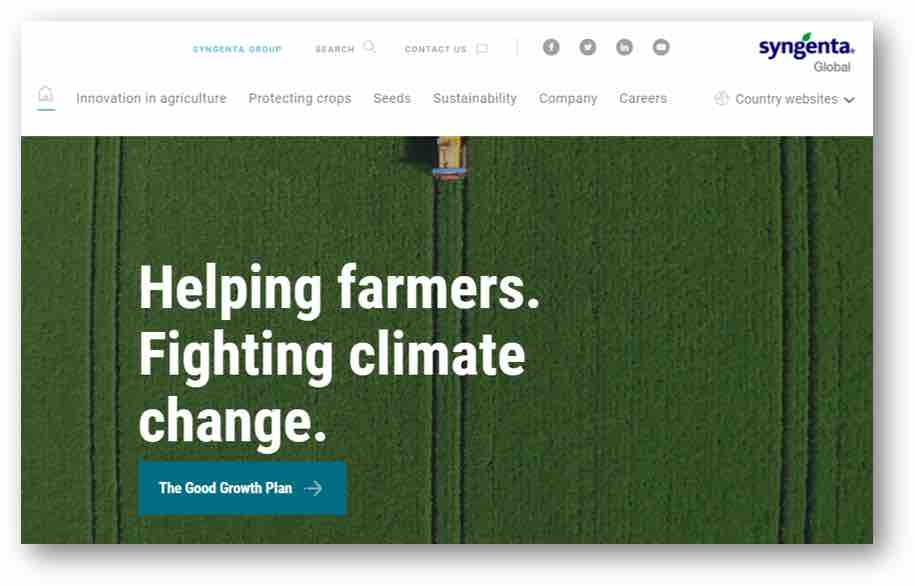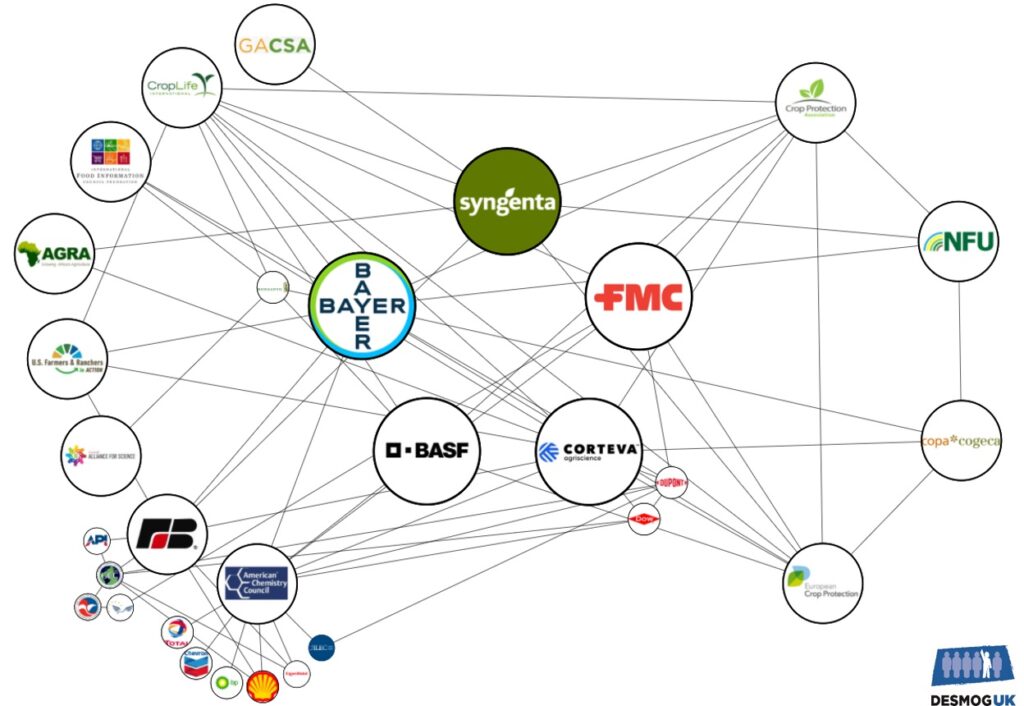Feature
Stretched Thin, Iowa Agency Issues Few Fines for Manure Pollution
Climate•9 min read
Perspective
Pesticide producers have a long history of lobbying against environmental regulations. Now, they're using power and influence to manipulate legitimate climate strategies for their own ends.


Words by Mat Hope
“Like a pandemic, climate change is an inevitable threat that we must address before it is too late … we need to support a recovery for farmers that puts the fight against climate change and biodiversity loss at its core.”
No, that’s not a statement from President-Elect Joe Biden, reassuring his new supporters that climate change is top of his agenda. It’s also not a statement from Greta Thunberg, or Bill McKibben, or any other environmentalist you might expect.
It’s a statement from Erik Fyrwald, CEO of Syngenta, one of the world’s largest producers of pesticides. You see, Syngenta is now a climate hero. Or, at least, that’s what the company wants you to think.
Syngenta’s latest marketing campaign seeks to transform its brand from eco-pariah into agriculture’s climate messiah. The company’s new motto, given pride of place on its website, is “Helping Farmers. Fighting climate change.”

Syngenta’s is the most eye-catching of a recent spate of new marketing campaigns from major pesticide producers, which seek to put them at the forefront of global efforts to tackle climate change.
But given these companies’ long histories of lobbying against environmental regulations, ecological destruction, and ties to purveyors of climate science denial, you’d be forgiven for greeting their new marketing with a raised eyebrow.
And you’d be right to do so.
A new investigation from my colleagues Sharon Kelly and Frances Rankin at DeSmog shines a light on how some of the biggest providers of chemicals that help farmers grow animal feed on an industrial scale are capturing legitimate strategies to address climate change and manipulating them to their own ends.
The companies’ ultimate aim? To present a sufficiently “green” face so that they avoid the kind of regulation that would require a fundamental change to their high-carbon business models.
From denial, to delay, to appropriation of the issue—the pesticide industry’s major players have progressed through the stages of the lobbyists’ climate playbook at a glacial speed. But they’re now firmly in the latter stages, pushing “regenerative,” “digital,” and “precision” agriculture as climate solutions—and massively over-hyping their potential.
Regenerative agriculture involves using farming practices that promote soil health and enable farms to absorb carbon emissions. Digital and precision agriculture strategies rely on technology to enable farmers to control the inputs and outputs of their farms down to the most minute details, insulating each individual farm against the growing risks of operating in a changing climate.
Making farming more efficient, and reducing the amount of pesticides agriculture needs, can mean farms lowering their overall emissions and cutting the amount of fossil fuels that go into the food-production process. And it’s this fact that major corporations are extremely keen to highlight.
“Planting genetically modified seeds enables farmers to use reduced tillage and no-till practices, which has resulted in a substantial reduction in carbon dioxide emissions,” a video by Bayer, the manufacturer of glyphosate-based pesticides like RoundUp, says.
“Integrated solutions that combine seeds, seed-applied technologies, agronomy advice, and digital services with crop protection products” can help farmers navigate the climate crisis, Corteva’s Chief Sustainability Officer, Anne L. Alonzo, argues in a sponsored post for Politico.
“Oh my gosh, I think that we are the solution to climate change,” an agriculture industry rep says over the radio in a shiny US Farmers and Ranchers in Action video, while the hard-working farmer drives his pickup truck past foreclosure signs and farmland. “We have not had the conversation that we actually can offset carbon for the fossil fuel sector,” they say.
That’s all well and good. But, oddly enough, you will find little or nothing in the way of acknowledgment that the world must also massively cut meat and dairy consumption—as scientists on the Intergovernmental Panel on Climate Change say we must—in these or any of the corporations’ marketing materials recorded in DeSmog’s new Agribusiness Database.
Why? Because farmers use an incredible amount of pesticides to grow food for the animals people eat. And pesticide companies are keen to keep it that way.
So can these strategies really make farms “carbon neutral”? All the experts DeSmog spoke to were quick to say that while there are some environmental benefits of these strategies, they were extremely unlikely to turn farms into the giant carbon sponges the companies are claiming they can be.
And there are other problems.
The long-term impacts of regenerative agriculture are largely unknown, and given the geographical variations in farmers’ needs it is far from a one-size-fits-all strategy,
Digital agriculture also does not imply a move away from pesticides (and the fossil fuels from which they’re derived), but a different way of using them. The drones and computers needed for digital agriculture are also extremely expensive, putting that supposed solution out of reach for many farmers across the world.
Ultimately, both strategies serve to perpetuate the status quo of agriculture—keeping large-scale farming reliant on the big five companies’ products, be they chemicals or software systems.
Nonetheless, these strategies are being pushed by a coordinated lobbying network doing its utmost to persuade the world that the pesticide industry is a climate leader before governments act to make it so.
If you map all the connections between the major pesticide producers and their trade groups and representatives (as DeSmog has), it becomes apparent very quickly that the coordination of this messaging is no accident.

From the American Chemistry Council (which counts big oil companies including Exxon, Shell, and BP as members) to CropLife International and its national-level associates, these groups use their privileged access to policymakers to persuade them against forcing climate regulation onto the industry.
And these groups have form when it comes to slowing action on climate change.
Farmers’ groups in particular are no strangers to climate science denial. In the 1990s, the American Farm Bureau Federation worked with the oil-industry backed Global Climate Coalition to oppose action on climate change. And well into the 2000s, high-profile members of the bureau were still publicly questioning whether climate change was caused by humans.
And while many farm groups such as the UK’s National Farmers’ Union now say that climate change is both real and a very significant threat, they continue to deny that moving away from animal-based diets is a core part of the solution.
No wonder they’re such allies to the pesticide industry, which continues to rely heavily on their business.
Agriculture clearly must adapt to be part of the solution to climate change. But like carbon capture and storage technology for the oil industry, the world’s largest pesticide producers are currently fixated on techno-fixes that don’t necessitate a move from their profitable status quo.
And given the huge systemic and structural changes that climate scientists say are needed to keep global warming to safe levels, that makes the industry’s apparent climate conversion appear to be little more than climate-washing.